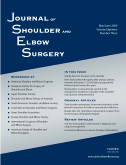
SHOULDER & ELBOW
Local infiltration analgesia with liposomal bupivacaine versus instercalene block in TSA
J Shoulder Elbow Surg. 2016 Nov;25(11):1742-174857 patients scheduled for total shoulder arthroplasty or reverse total shoulder arthroplasty were randomized to postoperative analgesia with either local anesthesia via infiltration of liposomal bupivacaine into surrounding tissues, or with regional anesthesia via an interscalene brachial plexus block. The purpose of this study was to compare analgesic efficacy between groups. The primary outcome was pain score on a visual analog scale. For the first 8 hours after surgery, pain scores were significantly higher in the liposomal bupivacaine group compared to the interscalene block group. Thereafter, differences between groups were not significant.
Unlock the full ACE Report
You have access to {0} free articles per month.Click below to unlock and view this {1}
Unlock NowCritical appraisals of the latest, high-impact randomized controlled trials and systematic reviews in orthopaedics
Access to OrthoEvidence podcast content, including collaborations with the Journal of Bone and Joint Surgery, interviews with internationally recognized surgeons, and roundtable discussions on orthopaedic news and topics
Subscription to The Pulse, a twice-weekly evidence-based newsletter designed to help you make better clinical decisions
Exclusive access to original content articles, including in-house systematic reviews, and articles on health research methods and hot orthopaedic topics
Or upgrade today and gain access to all OrthoEvidence content for just $1.99 per week.
Already have an account? Log in


Subscribe to "The Pulse"
Evidence-Based Orthopaedics direct to your inbox.
{0} of {1} free articles
Become an OrthoEvidence Premium Member. Expand your perspective with high-quality evidence.
Upgrade Now












































































